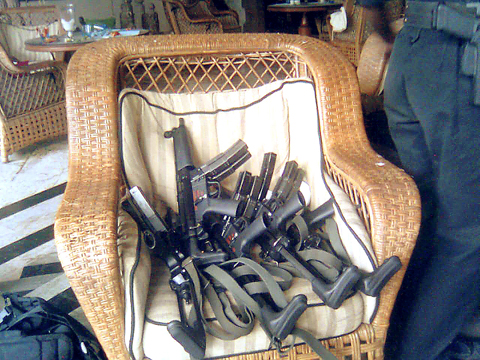With corpses still being pulled from a once-besieged hotel, India’s top security official offered his resignation yesterday as the government struggled under growing accusations of security failures following terror attacks that killed 174 people.
Indian Home Minister Shivraj Patil submitted his resignation letter to Prime Minister Manmohan Singh yesterday.
Finance Minister Palaniappan Chidambaram was appointed to take over Patil’s job and Singh will take over the finance portfolio for now, the government said.

PHOTO: AP
Indian TV reported that National Security Adviser M.K. Narayanan had also resigned.
“Our Politicians Fiddle as Innocents Die,” read a headline yesterday in the Times of India newspaper, part of a growing chorus of criticism.
The prime minister called a rare meeting of leaders from the country’s main political parties to discuss the situation yesterday.
New Delhi also said it was raising security to a “war level.”
“We will increase security and strengthen it at a war level like we have never done it before,” Minister of State for Home Affairs Sriprakash Jaiswal said.
Authorities were still removing victims bodies from the Taj Mahal hotel yesterday, where three suspected Muslim militants made a last stand before Indian commandos killed them in a blaze of gunfire and explosions on Saturday.
The landmark waterfront hotel, popular among foreign tourists and Indian high society, was surrounded by metal barricades, its shattered windows boarded over. At the iconic Gateway of India basalt arch nearby, a shrine of candles, flowers and messages commemorated victims.
“We have been to two funerals already,” Mumbai resident Karin Dutta said as she placed a small bouquet of white flowers for several friends killed in the hotel. “We’re going to another one now.”
The rampage was carried out by gunmen at 10 sites across Mumbai starting on Wednesday night. At least 239 were wounded.
One site, the Cafe Leopold, a famous tourist restaurant and the scene of one of the first attacks, opened yesterday for the first time since the mayhem, but police asked it to close just minutes later because they said the eatery needed permission first.
“I want them [the attackers] to feel we have won, they have lost,” restaurant manager Farzad Jehani said of the symbolic opening. “We’re back in action.”
Elsewhere in the trendy Colaba district where the fighting took place, shops were open and traffic flowed despite police barricades and heavy clean-up work around the Taj Mahal hotel.
The death toll was revised down yesterday from 195 after authorities said some bodies were counted twice, but they said it could rise again as areas of the Taj Mahal were still being searched.
Among the dead were 22 foreigners, from 11 countries. Nine gunmen were killed.
Also See: MUMBAI ATTACKS: India’s Jews mourn their dead as Olmert promises vigilance、 Mumbai attacks chill India’s economic prospects: analysts

RESPONSE: The transit sends a message that China’s alignment with other countries would not deter the West from defending freedom of navigation, an academic said Canadian frigate the Ville de Quebec and Australian guided-missile destroyer the Brisbane transited the Taiwan Strait yesterday morning, the first time the two nations have conducted a joint freedom of navigation operation. The Canadian and Australian militaries did not immediately respond to requests for comment. The Ministry of National Defense declined to confirm the passage, saying only that Taiwan’s armed forces had deployed surveillance and reconnaissance assets, along with warships and combat aircraft, to safeguard security across the Strait. The two vessels were observed transiting northward along the eastern side of the Taiwan Strait’s median line, with Japan being their most likely destination,

‘NOT ALONE’: A Taiwan Strait war would disrupt global trade routes, and could spark a worldwide crisis, so a powerful US presence is needed as a deterrence, a US senator said US Senator Deb Fischer on Thursday urged her colleagues in the US Congress to deepen Washington’s cooperation with Taiwan and other Indo-Pacific partners to contain the global security threat from China. Fischer and other lawmakers recently returned from an official trip to the Indo-Pacific region, where they toured US military bases in Hawaii and Guam, and visited leaders, including President William Lai (賴清德). The trip underscored the reality that the world is undergoing turmoil, and maintaining a free and open Indo-Pacific region is crucial to the security interests of the US and its partners, she said. Her visit to Taiwan demonstrated ways the

GLOBAL ISSUE: If China annexes Taiwan, ‘it will not stop its expansion there, as it only becomes stronger and has more force to expand further,’ the president said China’s military and diplomatic expansion is not a sole issue for Taiwan, but one that risks world peace, President William Lai (賴清德) said yesterday, adding that Taiwan would stand with the alliance of democratic countries to preserve peace through deterrence. Lai made the remark in an exclusive interview with the Chinese-language Liberty Times (sister paper of the Taipei Times). “China is strategically pushing forward to change the international order,” Lai said, adding that China established the Asia Infrastructure Investment Bank, launched the Belt and Road Initiative, and pushed for yuan internationalization, because it wants to replace the democratic rules-based international

RELEASED: Ko emerged from a courthouse before about 700 supporters, describing his year in custody as a period of ‘suffering’ and vowed to ‘not surrender’ Former Taiwan People’s Party (TPP) chairman Ko Wen-je (柯文哲) was released on NT$70 million (US$2.29 million) bail yesterday, bringing an end to his year-long incommunicado detention as he awaits trial on corruption charges. Under the conditions set by the Taipei District Court on Friday, Ko must remain at a registered address, wear a GPS-enabled ankle monitor and is prohibited from leaving the country. He is also barred from contacting codefendants or witnesses. After Ko’s wife, Peggy Chen (陳佩琪), posted bail, Ko was transported from the Taipei Detention Center to the Taipei District Court at 12:20pm, where he was fitted with the tracking